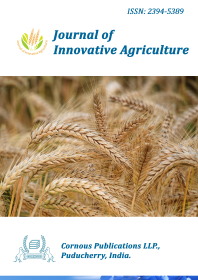
Journal of Innovative Agriculture
Peer Reviewed Open Access Journal
ISSN: 2394-5389 NAAS Rate: 4.05
Submit Manuscript
Peer Reviewed Open Access Journal
ISSN: 2394-5389 NAAS Rate: 4.05
Submit ManuscriptThe aim of this study is to measure agricultural engineering students knowledge and consuming habits for Medicinal and Aromatic Plants (MAPs) who are coming from different regions of Turkey. 35 % of respondents family members consume MAPs; furthermore, 45 % of them gather information about MAPs from internet or news. Supermarkets are frequently preferred places for buying MAPs (52 %). Respondents consume these plants especially when they get sick (45%). Peppermint is mostly used for curing the illnesses. Moreover, Thyme is mostly used to prevent illnesses and Linden is used both for prevention and curement. Another finding is that the difference between students who are taking the course in the university and who are not. It can be said that means if consumers can access information about MAP’s they will increase their consumption.
Medicinal, aromatic plants, consumer, attitude, university students
Hoareau, L., E.J. DaSilva. 1999. Medicinal plants: a re-emerging health aid. Electronic Journal of biotechnology, (2): 3-4.
Ibrahim Singab, A. 2012. Medicinal & Aromatic Plants. Medicinal Aromatic Plants, (1): e109.
Kizmaz, M., 1997. Production of medicinal, culinary and aromatic plants in Turkey. International Expert Meeting on Medicinal, Culinary and Aromatic Plants in the Near East, Forest Products Division FAO Forestry Department and the FAO Regional Office for the Near East, Cairo, Egypt, pp. 19-21.
Lange, D., 2002. Medicinal and aromatic plants: trade, production, and management of botanical resources. XXVI International Horticultural Congress: The Future for Medicinal and Aromatic Plants 629, pp. 177-197.
Leaman, D.J., Salvador, S., 2005. International Standard for Sustainable Wild Collection of Medicinal and Aromatic Plants (ISSC-MAP). Medicinal Plant Conservation Newsletter 11, 4-5.
Lubbe, A., R.Verpoorte. 2011. Cultivation of medicinal and aromatic plants for specialty industrial materials. Industrial Crops and Products 34, 785-801.
Marshall, E., 2011. Health and wealth from medicinal aromatic plants. FAO.
Máthé, Á. 2009. Medicinal and aromatic plants. Soils, plant growth and crop production. Enciclopedia of Life Support Systems. Disponible en linea en: http://www. eolss. net/Sample-Chapters C 10.
Okigbo, R., C. Anuagasi, J. Amadi. 2009. Advances in selected medicinal and aromatic plants indigenous to Africa. Journal of Medicinal Plants Research 3, 086-095.
Rao, M., M. Palada, B. Becker. 2004. Medicinal and aromatic plants in agroforestry systems. New Vistas in Agroforestry. Springer, pp. 107-122.
